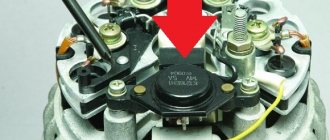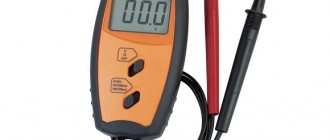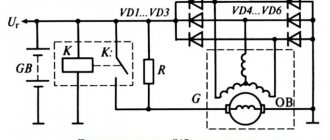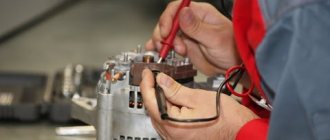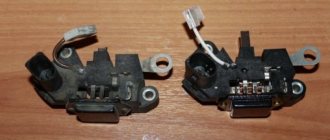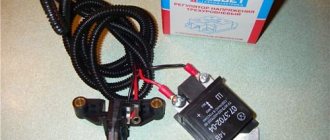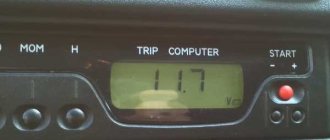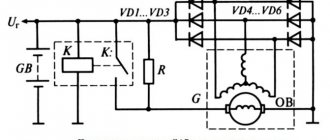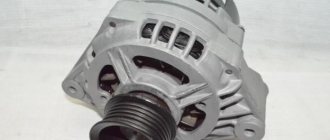Regulator device
The main source of current in a car is the battery. Consumers are powered from it: lighting and alarm devices, electronic devices, air conditioning and others.
While the car is moving, the battery is charged from the generator if it is working properly. Otherwise, the battery will quickly discharge, and deep discharge will lead to failure of the device.
The number of volts produced by the generator is highly dependent on the engine speed. At low speeds it is lower, and at high speeds it can reach an unacceptable value. Normal voltage is 13.4 V. The regulator maintains it within specified limits.
Main symptoms of a malfunction
There are two main “symptoms” of a relay failure. This is an undercharge or overcharge of the battery. Also, a malfunction of a part can be determined by the dim glow of the headlights or by a change in their brightness when the engine speed increases.
If undercharged, the car will start with great difficulty. However, the manifestation of this “symptom” may not be related to the generator. Therefore, first of all, you should make sure that the battery is in good condition.
If the battery is overcharged, there is no doubt that the problem lies precisely in the damaged relay. There are other possible causes of overcharging, but they are extremely rare. Overcharging may cause the battery to boil over. This can be determined by the decrease in the amount of electrolyte in the jars and the appearance of a white coating on the battery.
If you suspect that the battery is overcharged or undercharged, you should diagnose the generator.
Replacing the voltage regulator on a Priora
How to repair a voltage regulator? On modern cars - no way. It is simply irreparable and a failed part is simply replaced with a new one. Theoretically, even an electronic non-contact voltage regulator can be repaired - but few people do this - there is no point.
So, how is the voltage regulator replaced on a Priora? First, you should turn off the ignition and disconnect the negative terminal from the battery for reasons of electrical equipment and your safety.
Be careful not to mix up the wires going to the voltage regulator of the Priora generator - otherwise you can ruin both the relay-regulator and the generator itself.
On a Lada Priora car, the voltage regulator is installed separately from the generator. To remove the relay-regulator, you need to unscrew the nuts that secure the device to the body. Before this, you need to mark with electrical tape, tape or a marker the relative positions of the wires leading to the contacts of the regulator, and the contacts themselves.
Now you can install a new voltage regulator on the Priora to replace the old one. It is imperative to check the contacts where the relay-regulator is connected to the generator, as well as the tension of the generator belt. That's it, connect the battery, tighten the terminals and check the operation. And, of course, we make sure that on the Lada Priora the on-board voltage does not jump, but is even.
If the relay-regulator is installed in the same housing with the generator, then the algorithm is slightly different. After removing the negative terminal from the battery, disconnect the wires going to the generator (there is no need to remove it itself).
We open the plugs or unscrew the fastenings of the relay-regulator, depending on the design of the unit. We remove the plastic casing of the generator and find the relay regulator. We unscrew the fastening nuts and disconnect the screw fastening to the tire. Let's extract it. All that remains is to install a new relay-regulator - we perform this procedure in the reverse order of removal.
To check the operation of a new device, in this case, you need to fully charge the battery, connect it as expected, and start the engine at about 2500-3000 rpm. Using a universal tester or a special voltmeter, you need to measure the voltage at the battery terminals.
If you replaced the relay regulator correctly, the number on the display will be equal to that indicated in the vehicle’s operating instructions. If not, the relay regulator should be replaced again. It is forbidden to check the serviceability of the relay-regulator by short-circuiting its terminals - this can lead to the “death” of the rectifier unit.
Step-by-step replacement of generator brushes
replace worn brushes without removing the generator from your car. However, according to experts, this process will be much simpler if you remove the generator from its permanent place before replacing it. After the generator is removed, the replacement process is performed in the following order:
- using a screwdriver, remove the cover made of plastic to protect the generator in order to be able to get to the brushes;
- the connecting plug with wires is disconnected from the brushes;
- two fixing fasteners, which are located at the edges of the elements being inspected, are carefully unscrewed;
- using a size 13 wrench, unscrew the fixing bolt in the center of the element;
- after all the fasteners have been unscrewed, the brushes should be removed to inspect their external condition and replace them.
Read
Scheme for Priora
The amount of electrical voltage generated by the generator depends on two physical characteristics: the speed of rotation of the rotor and the magnitude of the magnetic field created by the stator. The regulator changes the second value.
In older designs, a resistance was connected in series with the stator winding. The main disadvantage of this method is the additional load on the on-board network.
Generator relay. Photo source: https://avtoarsenal54.ru/raznoe/generator-ot-kaliny-na-prioru.html
The Priora 115A generator voltage regulator relay periodically cuts off the current supply to the generator excitation winding. The higher the engine speed, the more often the shutdown occurs, and the amount of generated voltage decreases.
Possible causes of failure of the regulator relay
Modern relay models have a relatively long service life. But some factors can lead to premature failure of the element, namely:
- Low quality of the part itself.
- The occurrence of a short circuit.
- Mechanical damage to the part.
Popular brands:
Acura ZDX, Audi A7, Citroen C4, Infiniti Q60
The problem may also be caused by water ingress.
On some generator models, replacement of the electronic regulator relay will be necessary if the brushes are worn out. Under normal conditions, the life of the voltage regulator exceeds 60,000 km.
Selection of components
The original generator, installed on a car with a 16-valve engine at the factory, is marked with article number 5102.377. Its cost, as a rule, fluctuates around six to seven thousand.
Carefully check the generator itself and its packaging before purchasing so as not to encounter a counterfeit. It is important that the part is free of unevenness, chips and paint runs, as well as extraneous markings.
To avoid overpayments, you can purchase a similar original spare part. The following devices are suitable for installation on Lada Priora:
- VAZ (power 120/115a);
- KZATE (115a);
- BATE (90a);
- BOSCH (120a).
The price of analogues can be either higher or lower than that of the original. As a rule, it is in the region of 3500-6000 rubles. We choose a generator device with a large power reserve so that it lasts longer.
Keep in mind that installing less powerful generators is unacceptable, especially if you connect several different devices to the vehicle’s on-board network (when connecting a large number of electronics, it is generally recommended to increase the current). Before purchasing, we carefully check for damage to the case and the integrity of the unit.
Which generator is better to install?
Regardless of which generator is installed on the Priora, the owners of these cars often replace the unit due to the fact that not all devices allow connecting various equipment to the on-board network. Which manufacturer is good and which device is better to install on the Lada Priora?
You can supply generators of the following brands:
- BATE 90 ampere;
- KZATE 115a;
- BOSCH 120 amp;
- devices manufactured by VAZ for 120 or 115a.
Generator unit for Priora
In principle, other models of generator devices for domestic cars can be found on sale. When purchasing, the main thing is to check the integrity of the unit so that there are no signs of damage on the body. It is better to use high power so that there is a power reserve, thereby the device will last longer. In addition, it should be taken into account that it is not recommended to install less powerful generators, especially if many devices are connected to the vehicle’s on-board network.
Types of devices on Priora
The regulator installed on the Priora does not cope with its functions at peak loads. If the car has an air conditioner, then in the summer the electrical voltage often sags and the battery does not charge. Therefore, many drivers decide to replace the standard device.
Three-level
A replacement option is to install a three-level voltage regulator on the BATE Priora generator. The device allows you to select one of three operating modes:
- The minimum one, which provides a generator voltage of 13.4 V, like the standard one. The mode is suitable for the warm season.
- The second mode allows you to output 14.3 V and is used in cases where conventional electrical voltage is not enough.
- The maximum mode is suitable for use in winter. It allows the generator to produce 14.8 V.
For the BATE 90 A generator installed on the Priora, a three-level regulator is available that can replace the standard one without additional alteration or adjustment.
Remote
Installing a three-level regulator in its original location is not always effective. It is located in close proximity to the engine and gets very hot, which affects performance.
This problem can be solved by installing an external voltage regulator for the Priora generator. This is a three-level device, in which, unlike the standard one, the brush and working units are made separately and connected by conductors.
The brush block is installed in its usual place, and the regulator is fixed in any convenient accessible place to the vehicle's ground.
Thermally optimized
Any regulator lowers the charging voltage as the temperature rises. This is necessary to prevent the electrolyte from boiling in the battery. But the trouble is that the unit and the battery are located in different places under the hood. The device gets very hot and reduces the voltage, regardless of the temperature of the battery.
Replacing the voltage regulator on a Priora. Photo source: https://www.drive2.com/l/9306556/
The thermally optimized model does not have this drawback. It includes a temperature sensor, which is installed on the positive terminal of the battery. It maintains the required charging voltage depending on the temperature of the electrolyte, and not the unit itself.
What signs will indicate that the generator brushes are faulty?
The following external signs will help you understand that the generator brushes have become unusable on a Priora with power steering or air conditioning:
- length of the element being inspected;
- if upon inspection it is discovered that the length of the brushes is less than 5 mm, they must be replaced;
- Replacement also be required if the appearance of the brushes indicates uneven wear, that is, one element is heavily worn out, and the second is brand new. Uneven wear of these elements will certainly negatively affect the operation of the generator, so experts recommend replacing them without fail.
The cost of new components for the Priora does not exceed 150 rubles; of course, you can also find cheaper brushes for the generator, but it is unlikely that such elements will serve faithfully for a long period of time, and such savings will lead to a repeated procedure for replacing these components.
Standard generator on Priora - article number and price, where it is
The installation location may vary for different car brands and models. You should look for it in the engine compartment, near the rubber cushion on which the engine is mounted. 90A article 3282.3771, is a source of energy in the electronic equipment system of 2170-72 Priora cars.
Generator for Priora produced by BATE price from 4120 rubles
- Weight 5.5 kg
- LxHxW 200x170x200 mm
- Rectified current 90 A
- Power 0.98 kW
- Voltage 14 V 100 A
It has article number 5132.3771 and is a source of energy in the electronic equipment system of 2170-72 Priora cars.
Generator for Lada Priora with air conditioning manufactured by Pramo price from 4200 rub.
- Maximum rectifier current 100 A
- Weight 5.3 kg
- Voltage 14 V
- Power 233 W/kg
- Internal cooling
- Stator diameter 125 mm
- 115 A
It has article number 9402.3701-14 and is a source of energy in the electronic equipment system of 2170-72 Priora cars.
Article number - 2170-3701010-10 has a KZATE generator for the Lada Priora car, its price starts from 5300 rubles, and Bosch - 2170 3701010 13
Device manufactured by LKD - price from 4400 RUR
- Maximum rectifier current 115 A
- Weight 5.2 kg
- Nominal voltage 14 V
- Power 1610 W
- Stator diameter 125 mm
- Length 188 mm
- 115 A
It has article number 9402-14 and is a source of energy in the electronic equipment system of 2170-72 Priora cars.
120 A Has article number 9402-3701-14P, is a source of energy in the electronic equipment system of 2170-72 Priora cars.
- Maximum rectifier current 120 A
- Weight 6 kg
- Nominal voltage 14 V
Manufacturer ATE-1 cost from 4000 rub.
The generator tension roller 2170 serves to tension the belt. One of the important tips for beginners: if you unscrew any bolt when changing a part, lubricate it with graphite grease, this will greatly facilitate repairs in the future.
Alternator belt: how to tension, what tension should be and how to check
How to tension the alternator belt
Many car owners are interested in the question: how to tighten the alternator belt? After all, the battery charge level and the voltage in the car’s electrical network depend on this. Also, the condition of the belt itself, as well as the condition of the crankshaft bearings and the generator shaft, depend on how the generator belt is tensioned. Next, we will analyze in detail how to properly tension the alternator belt with a specific example.
The importance of tension level and checking it
Let's consider what unpleasant consequences an incorrect level of tension will lead to. If it is weakened, then there is a high probability of slippage. That is, the generator drive will not operate at rated speed, which in turn will lead to the level of voltage generated by it being below normal.
The result is an insufficient level of battery charging, insufficient electricity to power the vehicle systems, and operation of the electrical system under increased load.
If the belt is too tight, this can also cause excessive wear on the belt itself. And in the worst case, even to its breakage. Also, excessive tension has a detrimental effect on the bearings of the crankshaft and generator shaft, because they have to work under conditions of increased mechanical load. This leads to excessive wear and speeds up their failure.
Tension check
Tension checking process
Now let's look at the issue of checking tension. It’s worth mentioning right away that the force values are unique and depend not only on the make and model of the machine, but also on the generators and belts used. Therefore, look for the relevant information in the manuals for your car or in the operating instructions for the alternator or belt.
This will also be influenced by the presence of additional equipment installed in the car - power steering and air conditioning.
In general terms, we can say that if you press the belt on the longest section between the pulleys with a force of about 10 kg, then it should deviate by approximately 1 cm
What was the result?
Of course, it is impossible to say unequivocally that the factory generator is very bad. It fails only in the case of active use, for example, music, headlights and air conditioning. The 3-level pH is suitable for precisely such motorists. After installing this device, you can select 3 modes:
- 13.4 V – like a standard generator;
- 14.3 V – medium mode;
- 14.8 V – suitable for use in the cold season.
It is also worth noting that although the three-level regulator is much better, it is not an ideal replacement for the factory one. The fact is that both the first and second LVs have one significant drawback - they cannot regulate the voltage depending on the ambient temperature.
Do not forget that a new voltage regulator must be looked for solely by the markings of the old one. For example, for marking 4302.3771, TRN with mark 67.3702-02 is suitable.
Checking the work
How to use modes:
- Switch position “min” - for operation at high ambient temperatures (above 20ºС), as well as during operation in particularly difficult conditions (traffic in traffic jams, long climbs in the mountains, etc.);
- The middle position of the switch is for operation at ambient temperatures from 0ºС to 20ºС;
- The “max” switch position is for operation at low ambient temperatures (below 0ºC), as well as for recharging a discharged battery.
Average load (PTF, dimensions, music and heater fan at first speed)
:
Maximum load, maximum number of consumers activated
:
Will you be installing a three-level voltage regulator on your car? Take part in the survey and leave your feedback in the comments.
Let us remind you that another reason for low voltage on the on-board network may be a bad ground.
How to change the device without removing the generator
Replacing the voltage regulator on a Priora can be done without removing the generator.
Difficulties may arise due to poor access to the generator on cars with air conditioning. It is necessary to remove the air filter and the fastenings of the air conditioning pipes, you can also dismantle the right headlight.
Replacement sequence:
- remove the negative terminal of the battery;
- disconnect the main positive terminal of the generator;
- remove the generator cover by unscrewing 3 bolts;
- unscrew the 2 mounting screws and remove the regulator.
We install the new device by performing the operations in reverse order.
How to remove RN
You can remove the old regulator without visiting a service station. To do this, you need to perform the following operations:
- Disconnect the terminals from the battery.
- Using a 10mm wrench, unscrew the nuts from the stud and disconnect the power cable.
- Unfasten the three latches on the plastic casing. After this, access to the regulator opens.
- Next, unscrew the two screws with a size 8 wrench and disconnect another wire.
- After this, you can remove the factory LV and install a 3-level one.
Please note that installation of a new generator occurs in the reverse order. There is only one feature: you need to bring out two wires for the control module. It is very important that the control module is secured very well and that there is no chance of moisture getting in there.
No recharging of Lada Priora battery (VAZ 2170, 2171, 2172)
Checking electrical equipment
| 1. Check if the alternator drive belt is broken. If a break occurs, replace the belt and adjust its tension (see “Replacing the alternator belt”). |
| 2. If the belt is intact, check and, if necessary, adjust its tension (see “Generator belt tension”). |
| 3. If the belt tension is normal, check to see if fuse F1 in the fuse and relay mounting block has blown. The location of the fuses and their ratings are indicated in this manual (see “Electrical faults”), in the vehicle repair manual, in the electrical diagram, on the housing of the mounting block and on the fuses themselves. If the fuse is blown, replace it, start the engine and check to see if the low battery light goes out. If the light goes out, you can continue driving. |
5....to the starter...
| 4. If the battery discharge lamp does not go out, check the wires connected to the positive terminal of the battery... |
| 6. ...and to the generator. Wires may be broken, broken inside the insulation, or have oxidized or unreliable contacts. Correct the problem and start the engine. If charging current appears, you can continue driving. |
| If, after taking the measures, the charging lamp continues to light up while the engine is running, then the possible cause of the malfunction lies in the generator itself. There may be several reasons, and it is better to eliminate them in a car service center or garage, and you just have to hope that the energy reserve in the battery is enough to get to them. |
| Recommendation |
| In order to reduce current consumption when driving a car with a faulty generator, if possible, turn off the radio, unnecessary lights, heater fan, window defroster, etc. |
| You will need: flat-blade and Phillips-blade screwdrivers, a 12" wrench (two), a DC voltmeter, a megohmmeter. |
| 1. Remove the rubber boot and connect the “+” wire to the “B+” terminal of the generator, and the “–” wire to the generator housing. |
| 2. Start the engine and turn on the car's headlights. |
| 3. After 15 minutes of engine operation at medium speed, measure the voltage; it should be in the range of 14.4–15.1 V. If undercharging or overcharging is observed (the voltage does not fall within the specified limits), replace the voltage regulator. |
Description Identification numbers Keys Dashboard Instruments Trip computer Heating and ventilation Ventilation control Lock control Control of power windows Using seat belts Airbags Child seat Adjusting seats Adjusting the steering column Using mirrors How to shift gears What to carry Starting the engine Malfunctions when starting the engine Checking the ignition Checking the fuel supply Injection faults Lost idle If the engine runs unevenly Inspect the spark plugs Jerks while driving Does not accelerate Stalls while driving Loss of oil pressure Engine overheats No battery recharging Engine knocks Suspension knocks Gearbox knocks Causes of knocks and noises Steering wheel vibration Brake problems Replacing a wheel
priora-vaz.ru
Checking with a multimeter without dismantling
You can check the condition of the relay using a multimeter. In this case, the generator is not dismantled. Before starting diagnostics, it is enough to clean the battery terminals (their oxidation can affect the operation of the car and the readings of the measuring device).
The diagnostic procedure is as follows:
- First you need to start the engine and let it warm up for a few minutes.
- Next, you need to connect the multimeter probes to the battery terminals. The device displays a value of 20V.
- After this, the voltage is measured. It should be between 13.2–14V. Such readings are considered normal for most cars.
- Now you need to increase the engine speed (up to 2-2.5 thousand). The voltage should increase by about 0.2V.
- If it exceeds 3,500 rpm, the multimeter should show 14–14.5V, but no more.
Serious deviations in the readings of the device indicate the presence of breakdowns of the relay regulator.
What does it look like and where is it installed?
Now let's find out where the VAZ-2107 charging relay (carburetor) is located. Initially, this device was placed away from the generator on the arch under the hood (on the left side). On newer “sevens” equipped with an injection system, the voltage regulator was combined with a brush assembly.
The first voltage regulators were based on electromagnetic relays; they worked quite slowly and required constant intervention. The problem is that mechanical elements wear out very quickly. In addition, it was constantly necessary to adjust the gaps in the relay. Modern semiconductor devices operate silently, quickly, without electromagnetic relays. One silicon crystal can perform the functions of several mechanical relays.
( 2 ratings, average 4.5 out of 5 )
